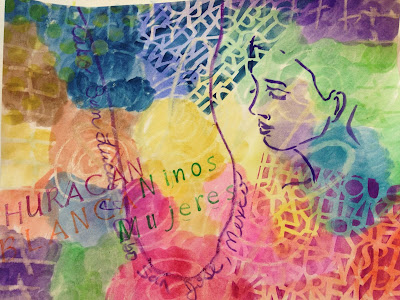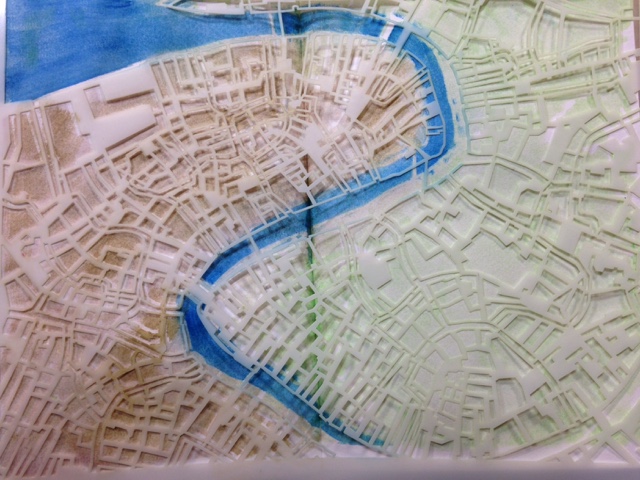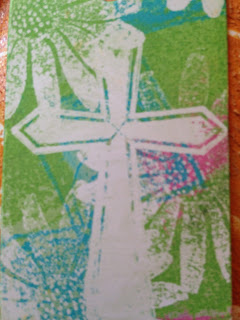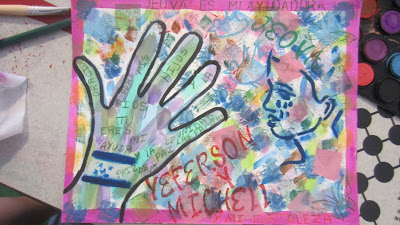Exodus: Egypt is on the left with the Nile River center and the Promised Land represented with green.
Art Journaling the Old Testament
One of the assignments for the class I'm teaching on the Old Testament (the final exam actually!) is to tell the story of the Old Testament in 5-7 minutes. They create an AV that tells the bold type of the story with one highlight from each of the 39 books. I'm going to art journal my version of the project so I can experience the journey alongside my students. I've begun very simply with watercolors and stenciling. I add to it and also switch up the media.
Art Journaling for Teaching Prep
The blank white page does not inspire me: to art, to write, to prep for preaching OR to prepare for teaching. I have realized and "owned" the fact the blank white pages just don't motivate me. At all. With that realization firmly in place I began an art journal for two summer courses I am teaching (online) at University of the Southwest.
I broke out my watercolor sprays and assorted stencils and spritzed a bunch of backgrounds in the two journals.
I didn't worry about colors or stenciling just put a lot of colors & textures on a dozen opening pages in each journal.
Experimenting with Stained Glass Stencils
It is so fun to experiment with a new anything art! I think the reason I'm a "mixed media" artist is for exactly that: an excuse to play with something (anything) new.
Cathedral stained glass window stencils (set of 4). I put all four on one journal page, broke out my various watercolor sets and started playing.
Watermark Resist (Stamping) Mixed Media Art
 I was intrigued when I saw the technique to use watermark resist (project by Rangerink.com) to make "resists" using stamped images on paper. The trick is that the paper must have a shiny surface in order for the technique to work properly. Otherwise, you can use any type of foam or rubber stamp and a variety of dye type inks. We experimented with the technique as part of a "team night" while on a mission trip in Mexico. I brought basic supplies which included one watermark resist stamp pad, several small stamps, and mini ink pads to be used for the dye after the watermark stamp had been allowed to dry overnight. The only shiny paper I had on hand was a stack of tags which are generally used literally for pricing and tagging items. We used these tags as the basis for our experimenting.
I was intrigued when I saw the technique to use watermark resist (project by Rangerink.com) to make "resists" using stamped images on paper. The trick is that the paper must have a shiny surface in order for the technique to work properly. Otherwise, you can use any type of foam or rubber stamp and a variety of dye type inks. We experimented with the technique as part of a "team night" while on a mission trip in Mexico. I brought basic supplies which included one watermark resist stamp pad, several small stamps, and mini ink pads to be used for the dye after the watermark stamp had been allowed to dry overnight. The only shiny paper I had on hand was a stack of tags which are generally used literally for pricing and tagging items. We used these tags as the basis for our experimenting.First, stamp the plain shiny paper with a watermark resist. The samples here show multiple stamps of the same image on one small tag. Allow to dry overnight. Then use a cotton ball or tissue to apply ink; gently rub off. Add additional stamps of colored ink on top if desired. Mix colors of ink as desired. Add elements of collage (like washi tape) as desired. Experiment. Do whatever you like for no particular reason!
 |
| I made one tag for each day on the mission trip. I'm not sure exactly how I will continue with them, but they are in my journal. |
Stacked Journalng on a Mission Trip
 |
| Messy handwriting looks FAB with stacked journaling. |
 |
| Layers and layers of neat and tidy writing also works well. |
 |
| No rules with stacked journaling...just write on top of writing on top of writing. |
 |
| Team art journaling after a day in the mission field. |
King of Kings Crowns for VBS art in a Colonia en Cabo San Lucas
 |
| Supplies: watercolors, crayons, brushes & cups for water. |
Cabo Church Art Workshop Mixes Art with Theology
 Integrating mixed media art in Christian education is an excellent way to help students of all ages embody the lesson through simple art techniques which are easily taught and require simple supplies. Art makes learning much more fun! There are almost unlimited projects you can create that use stencils and stamps. Once you have the basic tools (stencils and stamps), the art continues into infinity. An easy project is to talk about symbols and shapes and how they add meaning to people, places, and events. The art experience helps people to visually connect with the key themes of a particular (biblical) teaching.
Integrating mixed media art in Christian education is an excellent way to help students of all ages embody the lesson through simple art techniques which are easily taught and require simple supplies. Art makes learning much more fun! There are almost unlimited projects you can create that use stencils and stamps. Once you have the basic tools (stencils and stamps), the art continues into infinity. An easy project is to talk about symbols and shapes and how they add meaning to people, places, and events. The art experience helps people to visually connect with the key themes of a particular (biblical) teaching. |
| Lynn creates layers of meaning with stencils, stamped images and crayon |
 |
| Lynn working on layers. |
 |
| Stamped images add interesting layers to art. |
 |
| No fancy set-up required: art supplies scattered down the middle and GO. |
Art Training 101 at Cabo Church

 As part of our annual mission trip to work with Feeding Los Cabos Kids, a ministry of Cabo Church in Cabo San Lucas, Mexico, we spent an evening teaching how to incorporate mixed media art in Christian education for kids (and adults) of all ages. Various staff and volunteers spent two hours with an intense crash course which covered a variety of materials and methods. We did wax resist on pre-cut paper crowns. The crowns were traced around a Burger King crown on posterboard and cut out ahead of time. Because we did multiple projects very quickly, each person had only 15 minutes to decorate the crown with crayon (wax) and then do a watercolor wash so the wax would "resist" (show through). We talked about the different teaching options which could incorporate the crown as the project to symbolize the teaching. For example, Jesus is King of kings and Lord of lords; the three wise men at Christmas, or one of the kings in the Old Testament such as king Solomon or king David. It is a fun and easy project. No art skills required!
As part of our annual mission trip to work with Feeding Los Cabos Kids, a ministry of Cabo Church in Cabo San Lucas, Mexico, we spent an evening teaching how to incorporate mixed media art in Christian education for kids (and adults) of all ages. Various staff and volunteers spent two hours with an intense crash course which covered a variety of materials and methods. We did wax resist on pre-cut paper crowns. The crowns were traced around a Burger King crown on posterboard and cut out ahead of time. Because we did multiple projects very quickly, each person had only 15 minutes to decorate the crown with crayon (wax) and then do a watercolor wash so the wax would "resist" (show through). We talked about the different teaching options which could incorporate the crown as the project to symbolize the teaching. For example, Jesus is King of kings and Lord of lords; the three wise men at Christmas, or one of the kings in the Old Testament such as king Solomon or king David. It is a fun and easy project. No art skills required!Art of Tears inside a Detention Center for Immigrants Seeking Asylum
 |
| The prayer began by drawing around one hand, palm up symbolizing prayer. |
The art images here express the tears and prayers of immigrant women seeking asylum in the USA from the violence in their Central American homelands. There are 500 women and children incarcerated about 90 minutes from where I am a pastor, and it is my privilege to do art as a ministry of presence with them as they await the painstaking process of seeking asylum. The examples here are from a guided prayer mixed media meditation. These images were created two days following the attempted suicide of a young woman who had just been denied asylum and was about to be deported. She and her 4-year-old son have experienced horrific violence there...and they have nothing to go "home" to. The guided meditation was intended to help the women express their fears and also to cling to hope and the love of God for them and for their children.
 |
| The supplies I brought for the women to use in creating their prayer reflection. The "Jane Girl" stencils were very popular. |
The Hand(s) of Prayer
 |
| My sample evolved to be prayers for the women and children in Cabo as Hurricane Blanca nears. |
 |
| White crayon on watercolor card stock. |
Materials:
1.
Watercolor paper
2.
Watercolors and watercolor pencils
3.
Paintbrushes
4.
Crayons and/or oil pastels
5.
Stencils
6.
Stamps and stamp pads
7.
Colored pencils
8.
Cups for water; pitcher; paper towels
9.
Hair drier (to force dry watercolor)
Process:
1.
Rest one hand palm side up on a piece of
watercolor paper and use a white/light colored crayon or oil pastel to draw the
hand. The palm-side-up hand symbolizes an open prayer. As desired, add a border
and/or symbols in the remaining space of the watercolor paper.
2.
Use one or more colors of watercolor to
completely paint over the paper. During
the painting process think of the people, events, circumstances that you want
to include in the art prayer.
3.
Allow the watercolor to dry (or use a hairdryer
to force the paper dry).
4.
Use stencils and/or stamps to add the names of
the people, events, and/or circumstances to your prayer.
5.
Title the prayer. Put your name and date
somewhere on the page—either on the front or on the back.
Subscribe to:
Comments (Atom)

































